The enigmatic intelligence of crows has captivated scientists, bird enthusiasts, and casual observers alike.
These feathered creatures, often associated with mystery and folklore, stand out not just for their dark plumage but for a myriad of cognitive abilities that defy traditional notions of avian intelligence.
From tool use and problem-solving to advanced communication and adaptive behaviours, crows have earned their reputation as some of the most intelligent non-human animals.
Unravelling the reasons behind why are crows considered so intelligent sheds light on the fascinating ways in which nature’s evolutionary forces have sculpted the minds of these avian marvels.
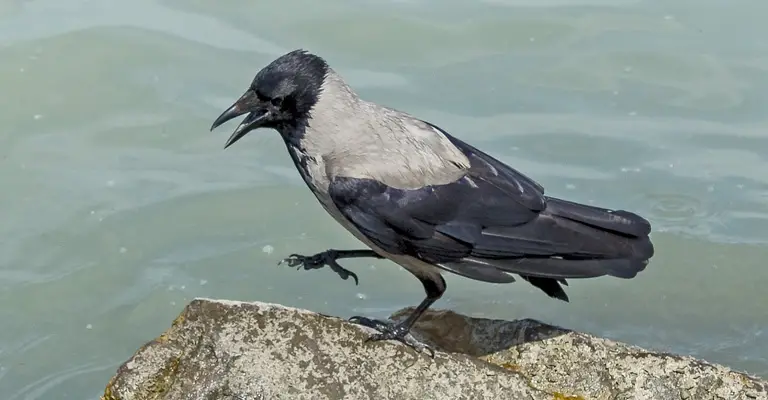
Why Are Crows Considered So Intelligent?
Crows are widely regarded as intelligent creatures due to an array of remarkable cognitive abilities and behaviours that set them apart from many other bird species.
Here are nine reasons why crows are considered highly intelligent:
Tool Use and Making
Crows exhibit the ability to use and even create tools for various tasks. They have been observed using sticks, leaves, and other objects to extract food from hard-to-reach places or modify materials to fashion tools suited to their needs.
Problem-Solving
Crows excel at solving complex problems, including multi-step tasks that require planning and foresight. They have been shown to understand cause-and-effect relationships and can devise strategies to obtain rewards.
Memory
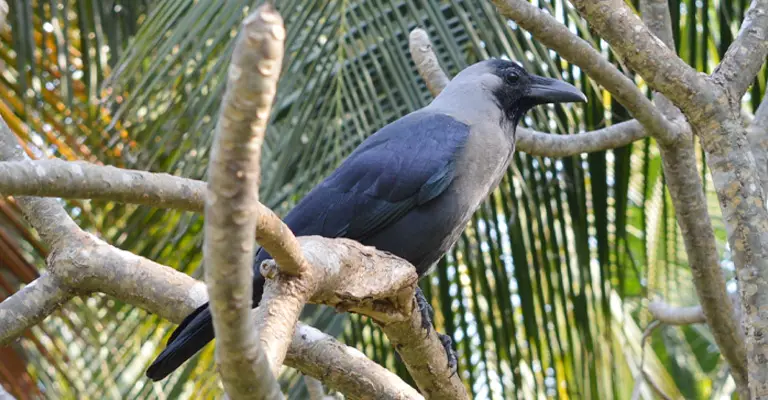
Crows possess impressive memory capabilities. They can remember the locations of food caches, recognize individual human faces and recall past interactions with people, which allows them to adapt their behaviour accordingly.
Communication Skills
Crows have a sophisticated system of communication, employing a wide range of vocalizations to convey different messages.
They can also recognize and differentiate the calls of individual crows, indicating a level of complexity in their communication.
Social Intelligence
Crows exhibit complex social behaviours, forming tight-knit family groups and engaging in cooperative activities. They are known to share information about food sources and dangers, displaying a high level of social awareness.
Self-Awareness
Some studies suggest that crows possess a form of self-awareness, as evidenced by their ability to recognize themselves in mirrors—an ability shared by only a handful of species, including great apes and dolphins.
Innovative Feeding Strategies
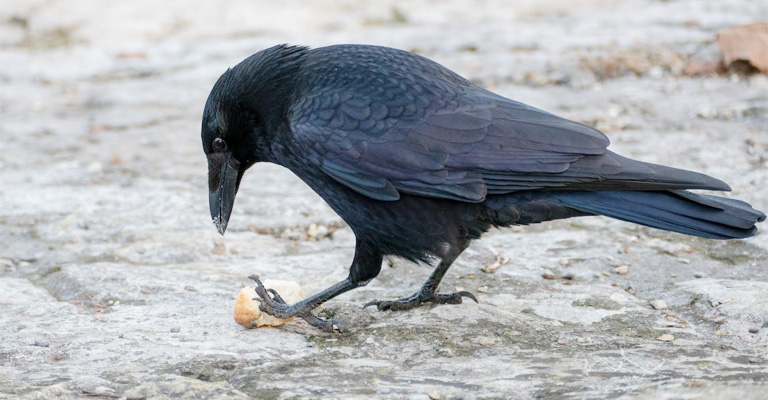
Crows demonstrate innovation in their feeding habits, adapting to different environments by exploiting available resources.
For example, they have been observed dropping nuts onto roads to crack them open with passing cars.
Learning from Others
Crows can learn from observing the actions of other crows. They can watch their peers solve problems or obtain food and apply the acquired knowledge to their own situations.
Adaptability to Urban Environments
Crows thrive in urban settings, demonstrating their ability to adapt to new and challenging environments. Their success in navigating human-altered landscapes highlights their resourcefulness and flexibility.
The intelligence of crows emerges from a combination of their advanced problem-solving skills, remarkable memory, intricate communication, social aptitude, and capacity for innovative behaviours. These attributes collectively position crows as highly intelligent creatures in the avian world.
Is A Crow More Intelligent Than A Cat?
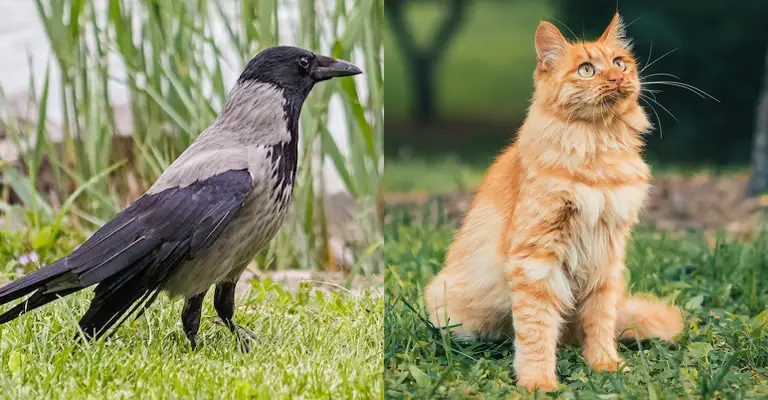
Comparing the intelligence of crows and cats is a nuanced endeavour that involves considering the diverse cognitive abilities displayed by each species.
Crows, renowned for their problem-solving skills, tool use, and complex social behaviours, are often considered highly intelligent among birds.
Their adeptness at tasks like using tools to extract food from tricky places and remembering the locations of cached items showcases their cognitive prowess. Crows can even recognize individual human faces, indicating a level of memory and learning that is remarkable.
On the other hand, cats possess their own set of unique cognitive traits. They exhibit keen predatory instincts, sharp senses and can learn to manipulate their environment to their advantage.
Cats are known for their agility, resourcefulness, and ability to adapt to various habitats.
While they may not display the same complex problem-solving abilities as crows, their intelligence is evident in their ability to hunt, communicate with other cats, and form social bonds with humans.
Determining whether a crow is more intelligent than a cat depends on the specific criteria used to evaluate intelligence. Crows excel in problem-solving and tool use, while cats showcase intelligence through their adaptability and specialized hunting skills.
Both species have evolved unique cognitive strategies that suit their ecological niches, making direct comparisons complex but highlighting the diversity of animal intelligence.
What Are Some Common Myths About Crows?
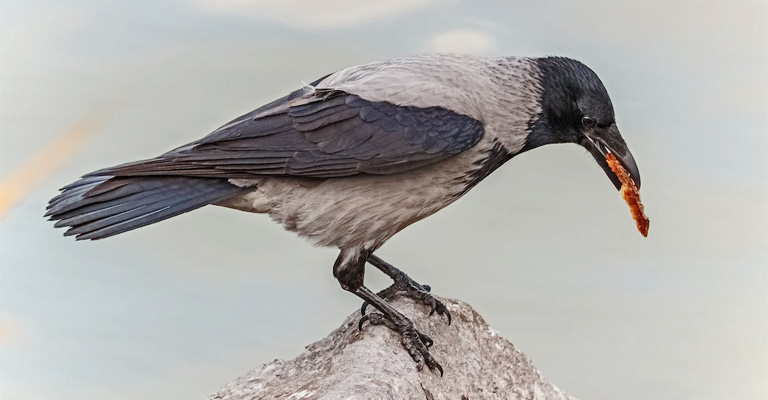
Crows are fascinating birds that have many myths and legends associated with them.
Some of the common myths about crows are:
Messengers Of The Gods Or The Dead
Many cultures believe that crows can communicate with the divine or the spirit world and that they can bring messages, warnings, or omens to humans.
For example, in Native American mythology, the crow is considered a trickster and a shape-shifter who can transform into different animals or humans.
The crow is also a mediator between life and death and can guide the souls of the deceased to the afterlife.
Symbols Of Bad Luck Or Death
Some cultures associate crows with misfortune or mortality and believe that seeing a crow or hearing its caw is a sign of impending doom.
For example, in European folklore, crows are often seen as harbingers of death and are said to fly over battlefields or graveyards to feed on the corpses.
In some superstitions, seeing a single crow means sorrow, seeing two crows means joy, seeing three crows means health, and seeing four crows means wealth.
Symbols Of Wisdom Or Intelligence
Some cultures admire crows for their remarkable cognitive abilities and their ability to use tools, solve problems, remember faces, and communicate with each other.
For example, in Greek mythology, the crow is sacred to Apollo, the god of prophecy and knowledge, and is said to have given him important information.
In Hindu mythology, the crow is associated with Shani, the god of justice and wisdom, and is said to be his vehicle.
Symbols Of Transformation Or Creation
Some cultures view crows as agents of change or creativity and believe that they can alter reality or bring new things into existence.
For example, in Norse mythology, the crow is linked to Odin, the god of magic and poetry, who has two ravens as his companions.
In Chinese mythology, the crow is connected to the sun and is said to have created the first humans from clay.
Symbols Of Loyalty Or Love
Some cultures respect crows for their strong social bonds and their devotion to their mates and offspring.
They believe that crows can show affection, compassion, gratitude, or revenge towards other crows or animals.
For example, in Japanese folklore, the crow is a symbol of love and fidelity and is said to mate for life. In Celtic folklore, the crow is a symbol of loyalty and protection and is said to guard the natural environment.
FAQ
Crows exhibit advanced problem-solving skills, tool use, memory capabilities, and complex social behaviours that set them apart from many other bird species.
Crows use tools to extract food from hard-to-reach places, demonstrating their ability to recognize the utility of objects in their environment for practical tasks.
Crows possess a diverse range of vocalizations, including “cawing,” which serves as a complex form of communication that conveys various messages and can even identify individual crows.
Crows have exceptional memory skills, allowing them to remember the locations of food caches, recognize individual human faces, and recall past interactions.
Crows adapt to various environments, even urban ones, showcasing their ability to exploit new resources and devise innovative feeding strategies, such as dropping nuts on roads to crack them open with passing vehicles.
Conclusion
In the intricate web of the natural world, crows shine as luminous examples of intelligence and adaptability.
Their toolkit of cognitive abilities, including tool use, complex communication, memory, and social awareness, showcases their capacity to navigate intricate challenges and exploit a diverse range of environments.
Through countless generations, crows have honed these skills, allowing them to thrive in various ecosystems, including urban landscapes.
The study of crow intelligence not only deepens our understanding of avian cognition but also raises intriguing questions about the convergent evolution of intelligence across species.
The crow’s intelligence offers a glimpse into the complex interplay of genetics, environment, and ecological pressures that shape the minds of animals, inspiring awe and respect for the avian world’s wondrous capabilities.